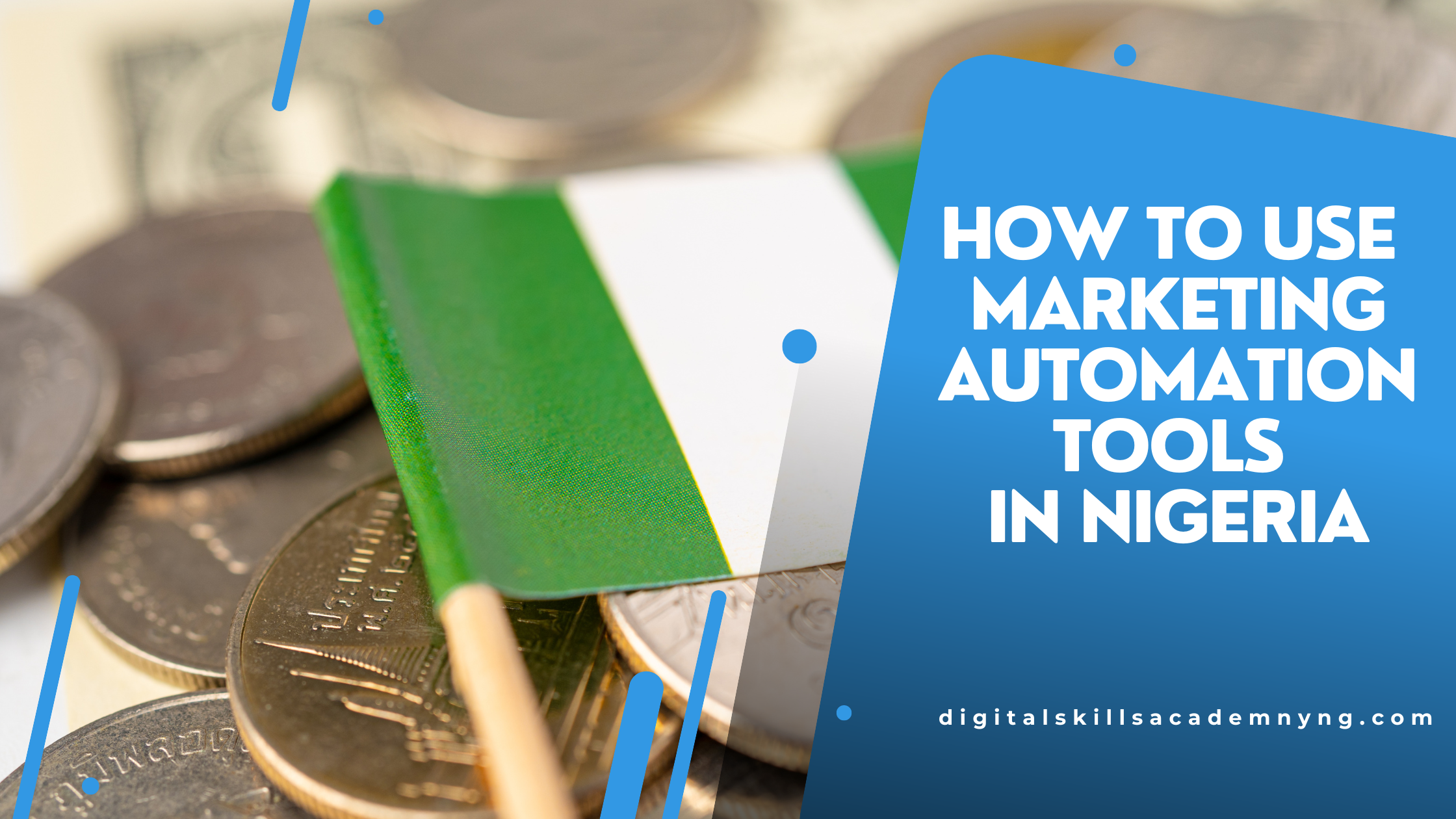Marketing automation, once seen as a tool for only large corporations, is now available and beneficial for businesses of all sizes. As Nigeria’s digital space continues to evolve, marketing automation is emerging as a key strategy for companies looking to enhance efficiency, increase customer engagement, and drive revenue growth.
Let us learn how to effectively use marketing automation in Nigeria, covering its benefits, tools, implementation strategies, and best practices tailored to the unique Nigerian market.
What is Marketing Automation?
Table of Contents
Marketing automation refers to using software and technology to automate repetitive marketing tasks. These tasks include email marketing, social media posting, lead nurturing, customer segmentation, and data analysis.
The goal is to streamline these processes, improve efficiency, and deliver personalized marketing experiences to customers, ultimately driving higher engagement and conversion rates.
Key Components of Marketing Automation
- Email Marketing Automation: Automating the process of sending personalized and timely emails to customers based on their behavior, preferences, and stage in the buyer’s journey. Tools like Mailchimp, HubSpot, and Active Campaign are commonly used for email marketing automation.
- Social Media Automation: Automating the scheduling and posting of social media content, as well as managing interactions across platforms like Facebook, Twitter, LinkedIn, and Instagram. Tools such as Hootsuite, Buffer, and SocialBee enable businesses to maintain a consistent online presence.
- Customer Relationship Management (CRM): CRM systems like Salesforce, Zoho CRM, and HubSpot CRM help businesses manage customer data, track interactions, and automate follow-up actions. This is crucial for building and maintaining strong customer relationships.
- Lead Generation and Scoring: Marketing automation tools can capture leads from various sources, assign scores based on their likelihood to convert, and automatically nurture them through the sales funnel. This allows sales teams to focus on high-potential leads, improving conversion rates.
- Analytics and Reporting: Automation tools provide comprehensive analytics and reporting features, enabling businesses to track the performance of their marketing campaigns, understand customer behavior, and make data-driven decisions.
Why Marketing Automation Matters in Nigeria
Nigeria is one of Africa’s largest economies and has a unique and dynamic market space.
With a rapidly growing population, increasing internet penetration, and a burgeoning middle class, the potential for digital marketing is immense. However, the market also poses challenges, including diverse consumer preferences, varying levels of digital literacy, and infrastructural constraints.
Marketing automation offers several advantages that are particularly relevant in the Nigerian context
- Scalability
In Nigeria’s growing market, businesses need solutions that can scale with their operations. Marketing automation allows businesses to manage increasing volumes of customer data and marketing activities without a proportional resource increase.
- Personalization
Nigerian consumers are becoming more discerning, expecting personalized experiences from brands. Marketing automation enables businesses to tailor their messaging and offers based on individual preferences and behaviors, increasing engagement and customer loyalty.
- Cost-Effectiveness
Many Nigerian businesses, especially SMEs, operate with limited budgets. Marketing automation reduces the need for large marketing teams by automating repetitive tasks, enabling companies to achieve more with fewer resources.
- Improved ROI
By targeting the right audience with the right message at the right time, marketing automation tools help businesses achieve higher conversion rates and a better return on investment (ROI).
- Data-Driven Decisions
In a competitive market like Nigeria, data-driven decision-making is crucial. Marketing automation tools provide actionable insights into customer behavior, campaign performance, and overall marketing effectiveness, empowering businesses to make informed choices.
Choosing the Right Marketing Automation Tool for Businesses
Selecting the right marketing automation tool is critical for maximizing its benefits. Here are some factors businesses should consider when choosing a tool;
- Business Goals
Identify your specific marketing objectives. Are you focused on lead generation, customer retention, or brand awareness? Different tools specialize in other areas, so choose one that aligns with your goals.
- Budget
Consider your budget constraints. While some marketing automation tools offer free plans, others offer premium pricing. Evaluate the cost-benefit ratio and choose a tool that provides the best value for your money.
- Ease of Use
The tool should be user-friendly and intuitive, especially if your team needs more technical expertise. A steep learning curve can hinder adoption and reduce the tool’s effectiveness.
- Integration
Ensure that the marketing automation tool can integrate seamlessly with your existing software and platforms, such as your CRM, website, and social media channels. Integration simplifies data management and enhances workflow efficiency.
- Customer Support
Reliable customer support is essential, especially when implementing a new tool. Look for providers that offer robust support options, including tutorials, documentation, and responsive customer service.
- Scalability
Choose a tool that can grow with your business. As your operations expand, you may need additional features or increased capacity. The tool should be flexible enough to accommodate your future needs.
How to Implement Marketing Automation into a Business
Successfully implementing marketing automation requires careful planning and execution.
Here’s a step-by-step guide to help businesses make the most of marketing automation;
Step 1: Define Your Objectives
Start by clearly defining your marketing objectives. What do you hope to achieve with automation? Common goals include increasing lead generation, improving customer engagement, and enhancing campaign ROI. Your objectives will guide the selection of automation tools and the design of your workflows.
Step 2: Identify Key Processes to Automate
Not all marketing activities need to be automated. Identify the tasks that are repetitive, time-consuming, and prone to human error. Common candidates for automation include email marketing, social media posting, lead nurturing, and customer segmentation.
Step 3: Choose the Right Tool
Choose a marketing automation tool that best suits your needs based on your objectives and budget. Take advantage of free trials or demos to evaluate the tool’s features and usability before making a final decision.
Step 4: Set Up and Configure the Tool
Once you’ve selected a tool, it’s time to set it up. This involves integrating the tool with existing platforms, importing customer data, and configuring workflows. Depending on the complexity of the tool, you may need to invest time in training your team or working with a consultant.
Step 5: Segment Your Audience
Audience segmentation is crucial for delivering personalized marketing messages. Use the automation tool to segment your audience based on demographics, behavior, purchase history, and other relevant criteria. This allows you to send targeted messages that resonate with specific groups.
Step 6: Create and Automate Campaigns
With your audience segmented, you can begin creating automated campaigns. This could involve setting up email drip campaigns, scheduling social media posts, or automating lead nurturing workflows. Ensure that your messaging is consistent and aligned with your brand’s voice.
Step 7: Monitor and Optimize
Marketing automation is not a “set it and forget it” solution. Continuously monitor the performance of your automated campaigns using the tool’s analytics and reporting features. Identify areas for improvement and make necessary adjustments to optimize results.
Step 8: Train Your Team
Ensure that your marketing team is well-versed in using the automation tool. Provide training sessions and resources to help them understand the tool’s capabilities and best practices. A well-trained team can maximize the benefits of automation.
Best Practices for Marketing Automation in Nigeria
To fully leverage marketing automation in Nigeria, businesses should adhere to the following best practices:
- Prioritize Data Quality
Accurate and up-to-date data is the backbone of effective marketing automation. Ensure that your customer data is clean, well-organized, and regularly updated. This includes collecting relevant contact details, preferences, and behavioral data.
- Focus on Customer Journey Mapping
Understanding the customer journey is crucial for creating effective automated workflows. Map out your customer’s journey stages, from awareness to purchase, and design automation workflows that cater to each stage. This helps deliver the right message at the right time, increasing the likelihood of conversion.
- Personalize Your Messaging
Personalization is key to engaging Nigerian consumers. Use the data collected through your automation tool to deliver personalized content and offers. This could include addressing customers by name, recommending products based on their purchase history, or sending customized emails on special occasions.
- Test and Iterate
Continuous testing and iteration are essential for optimizing your marketing automation efforts. Regularly test different elements of your campaigns, such as subject lines, call-to-action buttons, and messaging. Analyze the results and make necessary adjustments to improve performance.
- Align Sales and Marketing Teams
For marketing automation to be truly effective, there must be alignment between your sales and marketing teams. Ensure that both teams work towards common goals and that the automation tool facilitates collaboration. This includes sharing customer data, lead scoring criteria, and campaign insights.
- Stay Compliant with Regulations
With the introduction of the Nigeria Data Protection Regulation (NDPR), businesses must handle customer data responsibly and comply with legal requirements. This includes obtaining consent from customers before collecting their data and providing options for them to opt out of communications.
Case Studies: Success Stories of Marketing Automation in Nigeria
To illustrate the impact of marketing automation in Nigeria, let’s explore some real-life success stories:
Paystack
Scaling Customer Acquisition with Email Marketing Automation:
Paystack, a Nigerian fintech company, implemented email marketing automation to scale its customer acquisition efforts. By segmenting its audience and sending targeted emails based on user behavior, Paystack increased its conversion rates and reduced customer churn. The automation tool also allowed the company to send personalized onboarding emails to new customers, improving their overall experience.
Flutterwave:
Enhancing Customer Engagement through Social Media Automation:
Flutterwave, another leading fintech company in Nigeria, leveraged social media automation to enhance customer engagement. Using Hootsuite to schedule and manage social media posts across multiple platforms, Flutterwave maintained a consistent online presence and responded promptly to customer inquiries. The automation tool also provided valuable insights into audience behavior, enabling the company to refine its social media strategy.
Jumia:
Optimizing E-Commerce Sales with CRM Automation:
Jumia, one of Africa’s largest e-commerce platforms, utilized CRM automation to optimize its sales processes. By integrating Salesforce with its marketing automation tool, Jumia streamlined lead management, automated follow-ups, and improved customer retention. The automation also enabled Jumia to track customer interactions across multiple touchpoints, providing a 360-degree view of the customer journey.
Overcoming Challenges in Marketing Automation in Nigeria
While marketing automation offers numerous benefits, implementing it in Nigeria comes with its own set of challenges.
Here are some common obstacles and potential solutions;
- Limited Internet Connectivity
Challenge: Despite significant improvements, internet connectivity in some parts of Nigeria needs to be more reliable, which can affect the performance of cloud-based automation tools.
Solution: Opt for tools that offer offline capabilities or require minimal internet bandwidth. Additionally, consider using local data centres to host your automation software, reducing dependency on international servers.
- Data Privacy Concerns
Challenge: With the introduction of the Nigeria Data Protection Regulation (NDPR), businesses must handle customer data responsibly and comply with legal requirements.
Solution: Choose marketing automation tools that are NDPR-compliant and offer robust data protection features. Ensure that your data handling practices are transparent and that you obtain explicit customer consent before using their data.
- High Cost of Implementation
Challenge: The initial cost of implementing marketing automation can be prohibitive for small businesses in Nigeria.
Solution: Start with a basic plan or free version of the automation tool and gradually scale up as your business grows. Many tools offer tiered pricing plans that allow you to pay only for the features you need.
- Technical Expertise
Challenge: Implementing and managing marketing automation tools requires some technical expertise, which may be lacking in some Nigerian businesses.
Solution: Invest in training for your marketing team or consider hiring an external consultant to assist with the implementation process. Many marketing automation providers also offer customer support and training resources to help you get started.
- Cultural Relevance
Challenge: Nigeria is a culturally diverse country with varying consumer preferences. A one-size-fits-all approach to marketing automation may only resonate with some population segments.
Solution: Use the segmentation features of your automation tool to create culturally relevant marketing campaigns. This could involve tailoring your messaging, imagery, and offers to reflect the preferences and values of different demographic groups.
Future Trends in Marketing Automation
As technology continues to evolve, so will the capabilities and applications of marketing automation in Nigeria.
Here are some future trends to watch;
Artificial Intelligence and Machine Learning
AI and machine learning are increasingly integrated into marketing automation tools, enabling more sophisticated customer segmentation, predictive analytics, and personalized content recommendations. Nigerian businesses that adopt these technologies will be better equipped to deliver highly relevant marketing experiences.
Omnichannel Marketing
The future of marketing lies in omnichannel strategies that provide a seamless experience across multiple touchpoints. Marketing automation tools are evolving to support omnichannel marketing, allowing businesses to manage email, social media, SMS, and other channels from a single platform.
- Enhanced Data Privacy Features
As data privacy concerns grow, marketing automation tools will increasingly offer enhanced data protection features. Nigerian businesses must stay abreast of regulatory changes and ensure their automation practices remain compliant.
- Integration with E-Commerce Platforms
With the rise of e-commerce in Nigeria, marketing automation tools will likely offer deeper integration with e-commerce platforms, enabling businesses to automate product recommendations, abandoned cart emails, and personalized shopping experiences.
- Mobile-First Marketing
Given the high mobile penetration in Nigeria, marketing automation tools will continue to focus on mobile-first strategies. This includes optimizing emails for mobile devices, integrating with SMS marketing platforms, and delivering app-based notifications.
What We Say
Marketing automation is a powerful tool that can help businesses achieve greater efficiency, improved customer engagement, and higher conversion rates. By carefully selecting the right tools, implementing them strategically, and adhering to best practices, businesses can unlock the full potential of marketing automation.
As the digital space in Nigeria continues to evolve, staying ahead of the curve with marketing automation will be key to maintaining a competitive edge.




